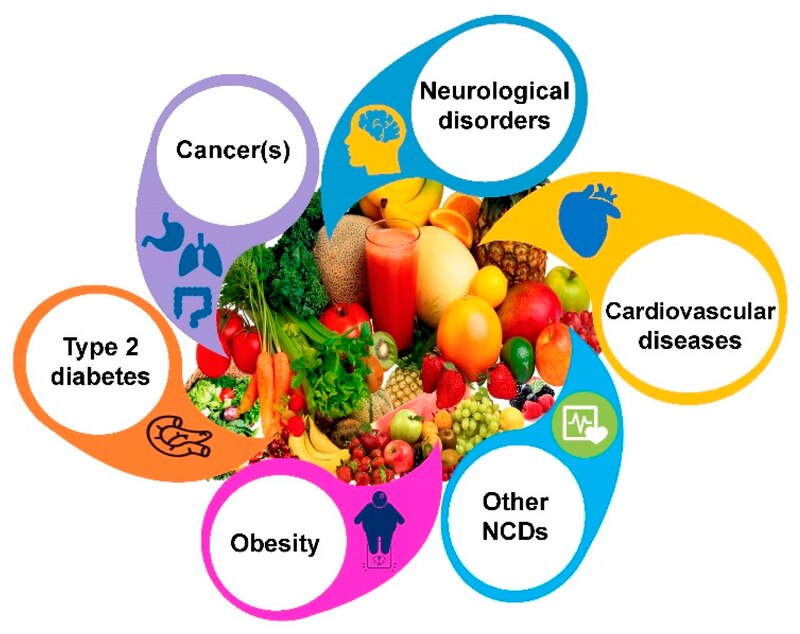Polyphenols, which are present in many types of plant-based foods, form a wide range of compounds. They are recognized for their possible positive effects on health. In this article, we will discuss polyphenols and learn about what they do as well as the different kinds available along with potential advantages associated with them, all while considering any side effects that could happen from using these substances.
Polyphenols in Foods
Polyphenols are found in plenty of foods that come from plants, and they bring a range of good health effects. This is why fruits, vegetables, nuts, and seeds as well as drinks such as tea or coffee not only have appealing colors but also offer good nutrition. Polyphenols help plants fight against things that stress them or cause illness, like the environment they grow in and harmful microorganisms (microbes). Additionally, the fight-back reaction of microorganisms can result in benefits for human health. This is why these types of foods are important for maintaining a well-rounded diet.
The variety of foods that contain polyphenols is broad, making it possible for people to include these items in their meals in many creative ways. From having berries with breakfast oatmeal to drinking green tea during the day or using herbs and spices as seasonings, there are numerous chances to include polyphenols into your daily diet.
- Consideration: Incorporating a variety of polyphenol-rich foods ensures a broader spectrum of health-promoting compounds, enhancing overall well-being.
- Tip: Opt for whole fruits and vegetables over processed forms to maximize polyphenol content and nutritional value.
Health Benefits of Polyphenols
Polyphenols are strong antioxidants, fighting against oxidative stress and inflammation in your body. They help to neutralize free radicals that can cause chronic diseases like heart problems, diabetes, and some forms of cancer by decreasing the risk factors for these illnesses. Also, polyphenols have anti-inflammatory effects which may assist with reducing symptoms related to inflammation sicknesses while enhancing general well-being and energy levels.

Additionally, new studies indicate that polyphenols might protect the brain. They could help in reducing the chances of cognitive decline and neurodegenerative illnesses such as Alzheimer's or Parkinson's disease. These discoveries highlight why it is crucial to include foods high in polyphenols as part of a healthy eating plan not just for body health but also mental functioning.
- Caution: While polyphenols offer numerous health benefits, it's essential to consume them as part of a varied diet rather than relying solely on supplements, as whole foods provide a broader spectrum of nutrients and bioactive compounds.
- Fact: Different cooking methods can affect the bioavailability of polyphenols in foods, with some processes like steaming and boiling preserving more of these beneficial compounds than others like frying.
Types of Polyphenols
Polyphenols, which are a group of compounds, have their chemical structure and activities in biology. They come in many forms like flavonoids, phenolic acids, stilbenes, and lignans, among others. Flavonoids are widely present in fruits, vegetables as well as beverages such as tea or red wine where they display great antioxidant and anti-inflammatory characteristics.
Moreover, foods that are regular parts of our diet like fruits and vegetables, whole grains, and EMS also contain phenolic acids. This adds to the positive impact on health from eating these dietary staples. The knowledge about different polyphenols can assist people in making wise decisions regarding their diet for the best health benefits and good condition.
- Consideration: The bioavailability of polyphenols can vary depending on factors such as food matrix, processing methods, and individual metabolism, highlighting the importance of consuming a diverse range of plant-based foods.
- Tip: Pairing polyphenol-rich foods with sources of vitamin C can enhance the absorption of these beneficial compounds, as vitamin C facilitates the uptake of certain polyphenols in the body.
Potential Side Effects
Polyphenols bring many good things for health, but some people might have negative reactions if they consume too much. Certain kinds of polyphenols, like tannins which are found in tea or specific,c fruits can cause problems in the stomach and gut such as feeling sick or having an upset tummy when you eat a lot of them. Also, some types may interfere with drugs and change how they get absorbed into your body or broken down by them.
One more important thing to think about is how each person has their tolerance and possible interaction, especially for the ones that have health issues or take medicines. Talking with a healthcare expert will help understand personal risk elements and offer custom suggestions for decreasing the chances of harmful results.
- Consideration: Individuals with gastrointestinal sensitivities may need to monitor their intake of polyphenol-rich foods to prevent digestive discomfort.
- Fact: Cooking methods such as fermenting or sprouting can reduce the content of certain polyphenols in foods, potentially mitigating their adverse effects on digestion for some individuals.
Moderation and Balance

Using foods that are rich in polyphenols within a balanced diet means you must use them with moderation and equilibrium. Try to have a mixture of fresh fruits, vegetables, whole grains, and other plant-based food items so that you can get different types of polyphenols along with the necessary nutrients. It is good to talk with your healthcare expert for tailored advice according to your health situation and food choices.
In addition, when you eat your food with mindfulness, like relishing every piece and being aware of your feelings when hungry or full, it can improve the total diet experience and encourage a good connection with what you eat. Putting emphasis on not going to extremes but instead finding a middle ground allows people to use polyphenols for their health and wellness over time.
- Consideration: Incorporating polyphenol-rich foods into meals alongside sources of healthy fats and proteins can enhance the absorption of fat-soluble polyphenols and optimize their benefits.
- Tip: Experimenting with different cooking techniques and flavor combinations can make incorporating polyphenol-rich foods into meals more enjoyable and sustainable in the long run.
Conclusion
Polyphenols, which are found in various plant-based foods, are bioactive compounds that could have many health advantages. They may provide antioxidant and anti-inflammatory actions, among other benefits such as supporting general good health. This shows that polyphenols can have a significant role in a balanced diet. Yet, it is crucial to take these substances with care and not overdo it due to possible side effects. This caution becomes more important for people who have certain health problems or take particular medicines because they might experience negative reactions from consuming excessive amounts of polyphenols. Put a mix of foods that contain lots of polyphenols in your diet to get benefits from these compounds and improve health and energy.




